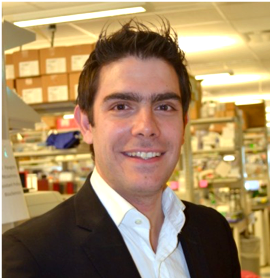
Prof. Panos Ntziachristos took over the task of running the NEXT_LEVEL project at Ghent University.
Prof. Ntziachristos is a CRIG group leader, works at Department of Biomolecular Medicine, Faculty of Medicine and Health Sciences, Ghent University. His research program comprises related inquiries regarding post-translational and epigenetic aspects of leukemia biology and how they control drug resistance.
More recently, he has focused on deubiquitination and the effect of the process on large biochemical complexes, such as the splicing machinery.
His past and current research have shown, for the first time in leukemia, that oncogenes antagonize heterochromatin marks, and enzymes controlling these marks may play pivotal roles in cancer development. Specifically, he demonstrated that the polycomb repressive complex 2 is a tumor suppressor, and JMJD3 demethylase is a pro-oncogenic factor in leukemia (Ntziachristos et al., Nature Medicine 2012 and Nature 2014). In the Nature story, he also demonstrated that UTX is a tumor suppressor in leukemia. He was a member of the team that identified that long non-coding RNAs control expression of oncogenic targets through genomic contacts, using chromatin conformation capture technologies (Trimarchi et al., Cell, 2014) and has led studies to characterize oncogenic three-dimensional chromatin domains (Kloetgen*, Thandapani*, Ntziachristos* et al., Nature Genetics, 2020, *equal contribution) and the oncogenic CTCF binding in blood and solid tumors (Fang, …Ntziachristos& and Zang&, Genome Biology, 2020, &co-senior/co-corresponding author).
A major line of research in his independent laboratory is related to active deubiquitination in leukemia. Ubiquitination, the addition of ubiquitin moieties to proteins, is a critical post-translational modification that controls stability and levels, as well as signaling potential or activity of proteins, and can go awry in cancer and other diseases. Nevertheless, the process of deubiquitination is not well characterized in leukemia. Using the ubiquitin-specific protease 7 (USP7) as a proof-of-principle molecule, his team has shown that deubiquitinases (DUBs) can be members of oncogenic transcriptional complexes. His team’s current studies show that specific deubiquitinases are upregulated in aggressive high-risk cases of leukemia and suggest that expression of deubiquitinases might be a prognostic marker in leukemia and deubiquitinase inhibition could be a therapeutic tool against aggressive leukemia. Important aspects of tumor biology affected by deubiquitination include oncogenes, such as NOTCH1, and aberrant splicing. They investigate these aspects in our group with a focus on the serine/arginine-rich splicing factors (such as SRSF6) and how they are regulated by USP7 (Zhou et al., Cancer Discovery, 2020).
Similar to USP7, we have identified other deubiquitinases with critical roles in relapsed and refractory T cell leukemia. His group has ongoing projects focusing on how deubiquitination controls therapy resistance leading to refractory or relapsed disease.
You can read more about prof. Ntziachristos’s scientific expertise and his achievements CRIG website.

